Objects Κέντρον Ερεύνης Ελληνικής Φιλοσοφίας
<< 10
10 >>
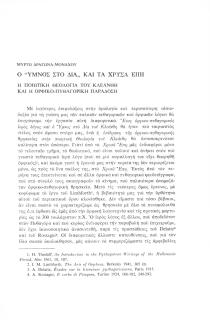
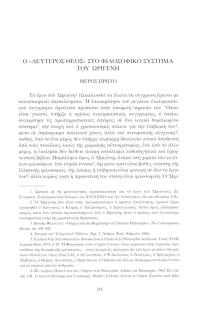
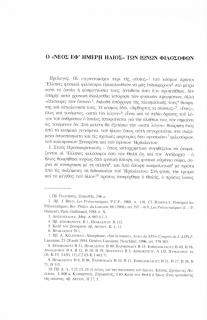
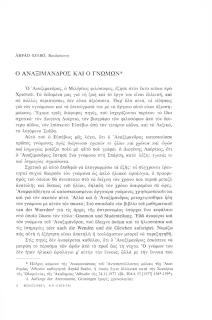
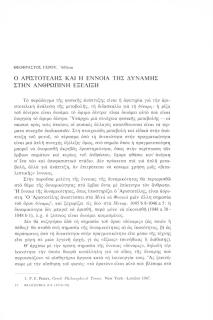
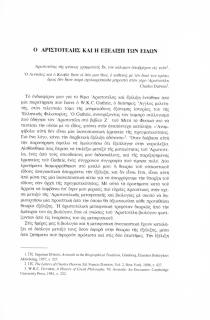
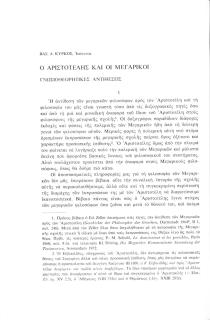
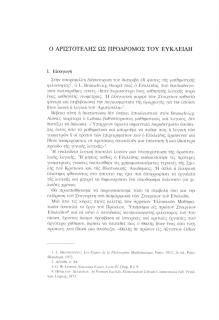
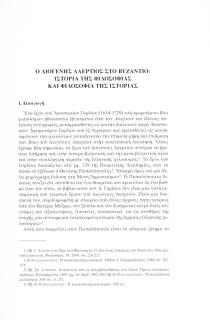
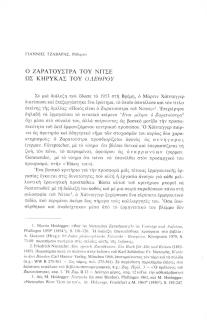
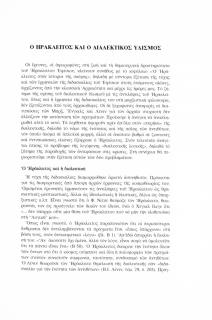
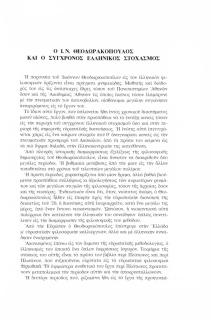 << 10
10 >>
<< 10
10 >>
Total: 4244

Ο «Ύμνος στο Δία» και τα Χρυσά έπη. Η ποιητική Θεολογία του Κλεάνθη και η ορφικο-πυθαγορική παράδοση
Ενότητα: Άρθρα του περιοδικού "Φιλοσοφία"
The purpose of this paper is to point out certain striking similarities observed between Cleanthes' Hymn to Zeus (lines 4,17,23-24,30) and the Golden Verses (lines 50-63) ; and on the basis of tenuous evidence to attempt to construct a reasonable hypothesis for their explanation. The investigation into the relationship of these two poems seemed worth undertaking not only in itself, but because by virtue of this and other relevant pythagorean and orphic texts it can provide a clue to the reconstruction of some corrupt verses of the Hymn and offer new appropriate readings. It has also been attempted with the intention of approaching stoic Theology to the orphico-pythagorean tradition in general and of marking the influence that the latter exercised on the former in addition to that of Heraclitus and other philosophical and medical schools predating Stoicism. By orphico-pythagorean tradition we mainly mean the corpus of religious poetry in circulation from the 4th century onwards, fathered on Orpheus and Pythagoras, without discussing here wh...
Ο «Δεύτερος Θεός» στο Φιλοσοφικό σύστημα του Ωριγένη
Ενότητα: Άρθρα του περιοδικού "Φιλοσοφία"
In spite of the official theological thesis that according to Origen Jesus Christ is subordinate to God, the great philosopher-theologist often considers him as a very strong «second god» (a concept not to be met in the texts of the Old or New Testament) though of course he often emphasizes the essential differences between the two first persons of the Trinity and the priority of the Father-God. The adoption of this concept, as we shall attempt to show in this study, is dictated mainly by the need of a demiurgic principle (causa efficiens), endowed with some of the traditional qualifications as are wisdom or mind. This choice ensures that God will not directly participate in the creational process.
Ο «νεός εφ' ημερή ήλιος» των Ιώνων Φιλοσόφων
Ενότητα: Άρθρα του περιοδικού "Φιλοσοφία"
L΄étude essaie de reconstituer une des doctrines concernant la recherche rationnelle de la nature de deux philosophes ioniens, Xénophane et Héraclite, la thèse du «soleil nouveau chaque jour». Cette doctrine est conservée dans un nombre très restreint de fragments (31 du Colophonien, 6 et 94 de l΄Ephésien dans l΄édition Diels-Kranz) et nombre de témoignages, parfois elliptiques. Si la pensée des «Présocratiques», en un général, nous révèle ce qu΄ont été en leur commencement la philosophie et la science, l΄investigation de cette doctrine ionienne concernant la nature et la force du soleil s΄avère révélatrice, à la fois, de l΄esprit rationnel de la nouvelle physique grecque et de l΄esprit philosophique: en témoignent le rejet de la connaissance sensible et certaines catégories, comme la catégorie dynamique du nouveau et la catégorie éthique de la mesure.
Ο Αναξίμανδρος και ο γνώμων
Ενότητα: Άρθρα του περιοδικού "Φιλοσοφία"
Ob der Gnomon des Anaximandros, den die spätantiken Quellen erwähnen, eine gewöhnliche Sonnenuhr für das Messen der Tageszeit war —oder eher ein astronomisches Instrument, um die exakten Grenzen der Jahreszeiten zu bestimmen? Nachdem es heißt, daß er mit dem Gnomon die Sonnenwenden und die Tag-und Nachtgleichen gezeigt hätte, es wird hier die Erklärung von astronomischer Seite her versucht. Ptolemäus schildert im Almagest II 5, wie man in Kenntnis der geographischen Breite eines Ortes die Längen der Mittagschatten des Gnomons an drei wichtigen Tagen des Jahres (zur Zeit der Sonnenwenden und der Tag-und Nachtgleichen) berechnen kann. Ursprünglich hat man selbsverständlich umgekehrt, eben aus dem Längenverhältnis des Gnomons zu seinem Mittagschatten (bei Tag- und Nachtgleiche) die geographische Breite je eines Ortes berechnet. Eine Vitruvius-Interpretation beleuchtet die Frage, wie Anaximandros die zu seiner Zeit «neue Methode» für diese Messung gefunden haben mag. Wohl dieselbe Entdeckung hat für ihn auch die Erkenntnis der sog. Schiefe d...
Ο Αριστοτέλης και η έννοια της δύναμης στην ανθρώπινη εξέλιξη
Ενότητα: Άρθρα του περιοδικού "Φιλοσοφία"
The doctrine of δύναμις provides the stepping stone for Aristotle’s analysis of change. The seed of a tree is potentially the mature tree. In present discussion of the notion of potentiality, I will limit myself and the reader to the argument on the potentiality in living things with a focus on man. I will concentrate the discussion on the meaning of potentiality a) as capacity, b) as a passage from potency to actuality either through art or by an innate principle, c) as έξις: A . Every sensory faculty is nothing but a faculty which exists only potentially, until the object stimulates it. Thus it acquires actuality. B . We discuss here the Megarian fallacy: A thing can act only when it is actually doing something. A man who is not building, the fallacy says, cannot build. The Megarian school not only denies potentiality but also experience. Aristotle refuses the Megarian school. My reservation about the way that Aristotle refutes the Megarian school is that if we believe that there are potentialities in men, it is not necessary to limit...
Ο Αριστοτέλης και η εξέλιξη των ειδών
Ενότητα: Άρθρα του περιοδικού "Φιλοσοφία"
This article examines W. K. C. Guthrie΄s suggestion that Aristotle΄s doctrine of substantial form (eidos) no longer has value, since "it makes Darwinian evolution impossible". While it is true that in his biological writings Aristotle excludes the evolution of species, I suggest that his metaphysics is eminently receptive to the theory should the facts support it. He elucidates, moreover, basic philosophical questions, which must be confronted by any theory of evolution. Doctrines that are fundamental for a theoretical consideration of evolution are his concepts of act and potency, form and finality, the nature of causation and the explanation of chance. Questions raised by evolution to which Aristotle΄s metaphysics, however, is unable to respond include the ultimate significance of finality and the question of existence itself. Eidos is for Aristotle the deepest principle of individual substance. Form is inseparable from finality; individuals are properly realised and defined in the completed actuality of their nature: physis is both ori...
Ο Αριστοτέλης και οι Μεγαρικοί. Γνωσιοθεωρητικές αντιθέσεις
Ενότητα: Άρθρα του περιοδικού "Φιλοσοφία"
Die Einwände des Aristoteles gegen die Erkenntnislehre der megarischen Schule lassen sich wohl auf folgende drei Gesichtspunkte zusammenfassen: 1. Auf den Gesichtspunkt der Möglichkeit der Erkenntnis selbst (Fr. 27 D.). Damit hängt die Frage nach dem Sinn des Seienden als Gegenstand der Erkenntnis zusammen: So behaupten die Anhänger Stilpons und die Megariker, daß das Seiende eins ist und daß das Nichtseiende (: έτερον) nicht existiert [Eus., Pr. Εν. XIV 17,1 (΄Döring 27)]. In den Werken des Aristoteles finden wir zwar keine konkrete Aussage über diese Ansicht, aus einer Stelle der Metaphysik (Γ 4, 1007a 20) jedoch läßt sich mit einiger Sicherheit erschliessen, daß er die megarische Auffassung des Seienden kannte: όλως δ΄ αναιρούσιν οι τούτο λέγοντες ουσίαν και το τι ην είναι. Mit dem Wort τούτο meint er wohl die gleich vorher dargelegte Ansicht, daß die Prädikate, die über ein Subjekt ausgesagt werden, ein συμβεβηκός seien und daß das Subjekt selbst im Grunde genommen immer eins sei (Γ4, 1007a 10-15). Nun wissen wir, daß die Megariker e...
Ο Αριστοτέλης ως πρόδρομος του Ευκλείδη
Ενότητα: Άρθρα του περιοδικού "Φιλοσοφία"
Thanks to Proclus' Commentary to Book I of Euclid's Elements, as well as the Summary of Eudemus, we can devise a relatively clear image of Greek mathematics during the 4th century B.C. Thus we know that the first writer who composed the elements of Geometry before Euclid, is Hippocrates of Chios. On the other hand in the Platonic Academy they employed the treatise of Theudios. Although we do not have any particular references it is most probable that they developped essays of geometric elements. Nonetheless in the Platonic Dialogues we notice an attempt to elucidate certain primary considerations from which follow all the remaing concepts. We do not know what Aristotle gained from the first and second generation of the Platonic Academy, the notion of "elements" are familiar to him. Although the organization regarding the "elements" does not constitue a particulat treatise of Aristotle, we can distinguish in numerous fragments, definitions and methods, which comprise a part of the Euclidean Elements. The Aristotelian Analytics includ an ...
Ο Διογένης Λαέρτιος στο Βυζάντιο: Ιστορία της Φιλοσοφίας και Φιλοσοφία της Ιστορίας
Ενότητα: Άρθρα του περιοδικού "Φιλοσοφία"
The paper is trying to further elucidate the presence of Diogenes Laertius' Lives of the Philosophers in Byzantium. The Most Ethical Lives of the Philosophers by Anastasios Gordios (1654-1729) proves the vigor and the persistence of the Lives of philosophers' genre in the Greek philosophical tradition up to its Neo-Hellenic period. The preoccupation with this genre does not signify only a reaction to scholasticism, as it is said, but refers to a distinction between systematic philosophy and lived philosophy; the respective uses of Diogenes Laertius by Hegel and Kierkegaard makes the distinction clear. A similar difference between doctrinal philosophy and the way of thinking is present in Laertius' Lives, in the proclaimed aporia about the philosophical category to which the Pyrrhonian school belongs to and, also, in the 9th book where all the individual, un-categorized philosophers are examined. The individualistic trend is evident in the Byzantine philosophers and, if the Laertian distinctions are not clearly mentioned in the Byzantine co...
Ο Ζαρατούστρα του Νίτσε ως κήρυκας του ολέθρου
Ενότητα: Άρθρα του περιοδικού "Φιλοσοφία"
Auf dem fruchtbaren Boden der Heideggerschen Interpretation von Nietzsche΄s Zarathustra wird versucht, die Frage nach dem eigentlichen Charakter der Nietzscheschen Lehre und Intention zu beantworten. Es wird dabei zuallererst gefragt, ob überhaupt die Figur von Nietzsche΄s Zarathustra selbst vorbehaltlos als eindeutig, einfältig und vollendet ausgelegt werden kann und nicht vielmehr als innerlich gespalten, problematisch und im Rei- fungs- bzw. Untergangsprozeß befindlich begriffen werden muß. Das von Nietzsche erzählte Leben Zarathustras läßt sich als eine Tragödie interpretieren. Sowohl die anfängliche Einsamkeit des Einsiedlers wie auch sein späterer «Untergang» zur Menschenebene weist manche Züge einer gewollten Selbstzüchtigung und Selbstbeschädigung auf. Die schon früh im Nietzscheschen Denken geprägten Begriffe der Tragik und des tragischen Helden kommen im Zarathustrabuch zur vollen Entwicklung und Darstellung. Hauptsächlich in Zarathustras Vorrede, aber auch in den darauf folgenden Reden läßt sich der beabsichtigte Untergang als ...
Ο Ηράκλειτος και ο διαλεκτικός υλισμός
Ενότητα: Άρθρα του περιοδικού "Φιλοσοφία"
Un grand nombre de théoriciens de l΄ex-Union Soviétique considérait Héraclite, comme le précurseur du matérialisme dialectique. Cette tendance de faire assimiler le philosophe d΄Ephèse à un avant la lettre précepteur des principes de la dialectique marxiste fut accompagnée d΄une distinction rigide entre logique formelle et logique dialectique. Cette évaluation, en ce qui concerne la logique formelle, fut presque négative - car ces théoriciens adoptaient le mépris de Hegel envers cette faculté. Pourtant, bien qu΄ils reconnaissaient en logique dialectique une science presque véritable, dans le cadre où elle représentait «la logique du réel», ils adoptaient, en même temps, la défense de tout fractionnisme dans le sein du Parti Communiste, établie par un décret spécial au cours des travaux du Lomé colloque du Parti Communiste Russe. Ce n΄est qu΄à la fin du 20ème siècle que la distinction figurative entre logique formelle et logique dialectique, après avoir servi pendant une longue période les intérêts du Parti Communiste, fut finalement abando...

